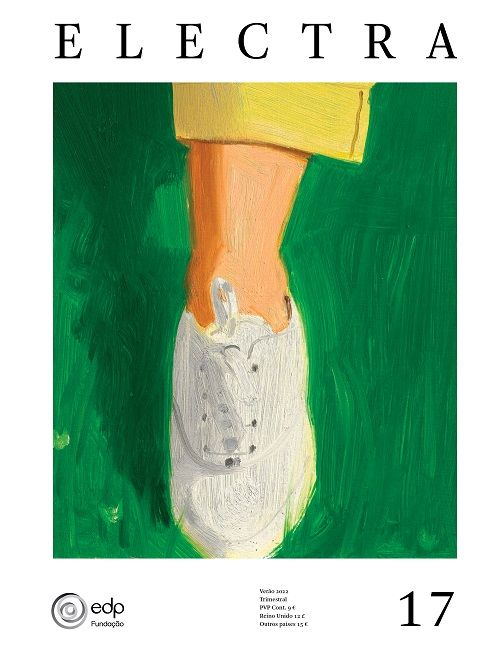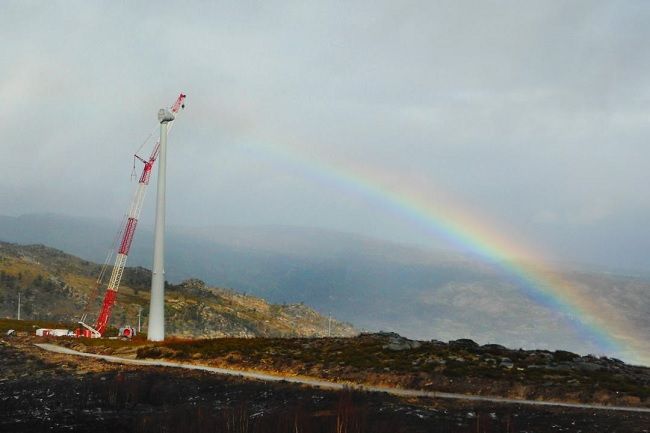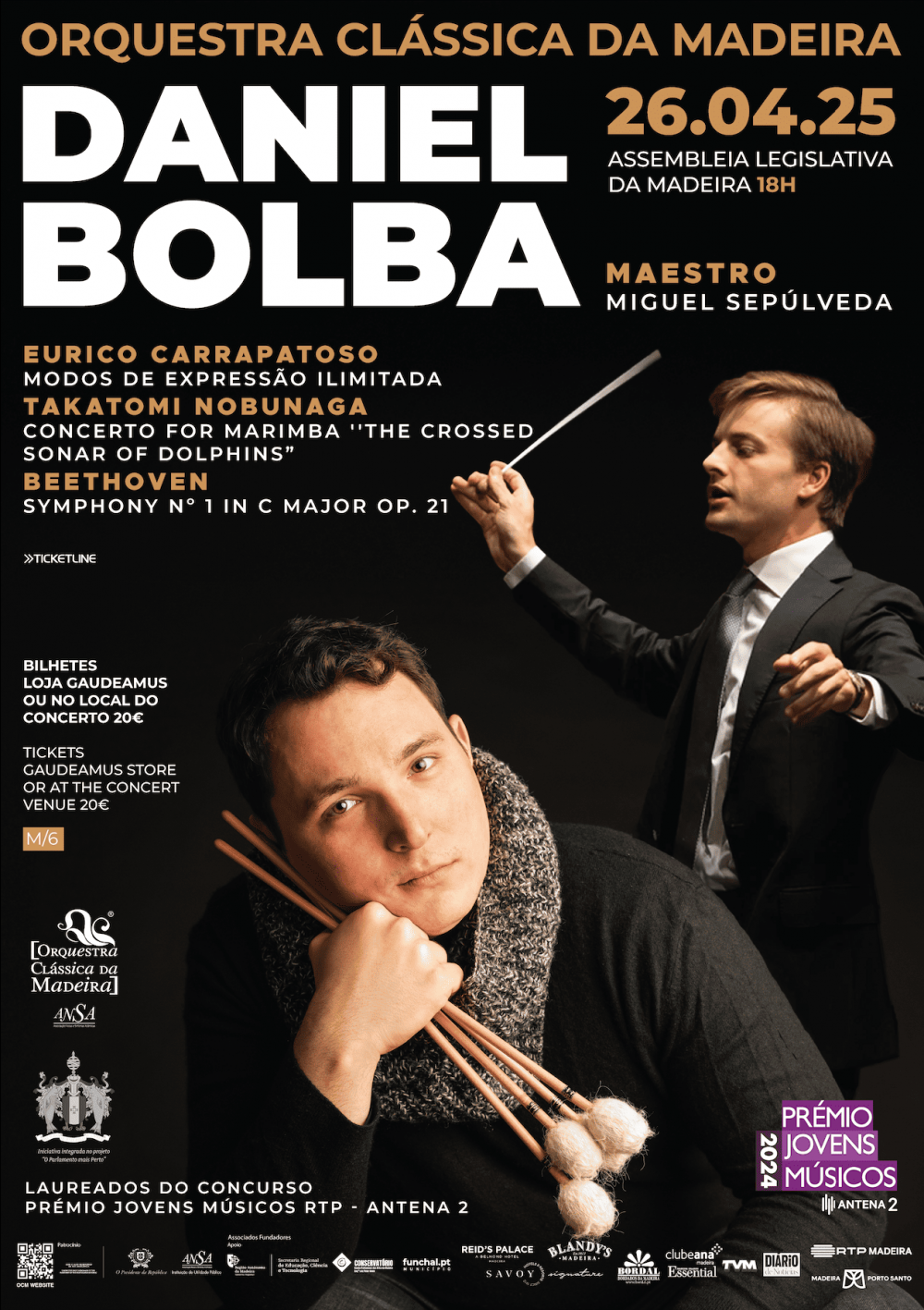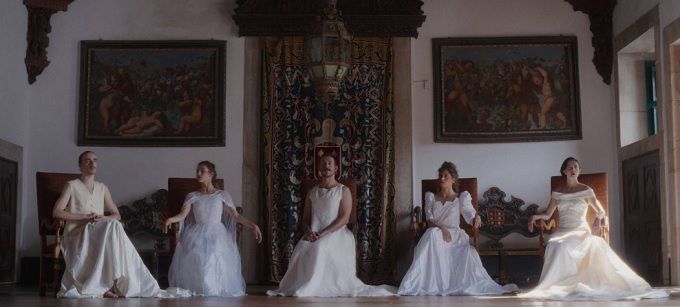Publicações
17ª Edição da Revista ELECTRA
A Electra 17 está à venda nas bancas, livrarias e em electramagazine.com

O Futebol tornou-se no nosso tempo um facto social total. Ele é hoje um sistema poderoso e complexo que está para lá dos estádios e das competições desportivas e invadiu o nosso quotidiano. Ele atrai o poder político e mobiliza de forma extrema e exacerbada o poder económico e mediático. É um mundo marcado por heróis e por cultos, um fenómeno que irradia em muitas direcções e a que dedicamos o dossier da Electra 17, com textos de Bernardo Futscher Pereira, João Sedas Nunes, José Florenzano, José Neves, Luiz Guilherme Burlamaqui, Marc Perelman, Marcos Cardão e António Guerreiro.
Também em destaque, neste número, estão a entrevista e o portfólio do consagrado pintor norte-americano Alex Katz. No ano em que completa 95 anos e são organizadas importantes retrospectivas da sua obra, no Museu Guggenheim, em Nova Iorque, e no Museo Thyssen Bornemisza, em Madrid, Katz conversa com Juan Manuel Bonet, antigo director do Museu Reina Sofia, sobre a pintura e os pintores, a cor e a luz, a vida e os lugares dela.
Na secção “Primeira Pessoa” é entrevistado James Wood, considerado por muitos como o crítico literário mais aclamado, dominante e temido das últimas décadas. Em conversa com Afonso Dias Ramos, Wood reflecte sobre a sua vida e obra enquanto leitor, crítico, professor e escritor.
Nesta edição de Verão de 2022, o ano em que se comemora o centenário do nascimento de Pier Paolo Pasolini, Vinícius Nicastro Honesko, Bruno Moroncini e Carla Benedetti — autores de ensaios e estudos sobre o cineasta, o escritor, o ensaísta, o intelectual — evocam esta figura maior da Itália do século XX e sublinham a sua actualidade.
Youssef Rakha é escritor, jornalista, crítico literário, com uma obra reconhecida e premiada. Os fotógrafos e editores André Príncipe e José Pedro Cortes encontraram Rakha no Cairo, cidade onde nasceu e vive, e falaram de política, de religião, de arte, de viagens, da vida, num trabalho em que as palavras e as imagens se desafiam, publicado na secção “Planisfério”.
O título de uma famosa obra de Vermeer, dá nome à secção “Vista de Delft” da Electra. E é dessa obra, Vista de Delft, da cidade que nela se representa, Delft, e da cidade onde ela se pode ver, Haia, que nos fala José Manuel dos Santos nesta edição.
Para o “Livro de Horas” da Electra 17, Pedro Neves Marques, que representa Portugal na Bienal de Arte de Veneza deste ano, com o projeto Vampires in Space, constrói, a partir desta instalação narrativa, um diário, feito de evocações e meditações, abordando questões de identidade de género, sexualidade e reprodução queer.
Ainda nesta edição, o sociólogo italiano Paolo Perulli faz uma genealogia e a história dos «criativos»; Ana Rocha, a propósito do bicentenário de Gustave Flaubert, analisa um episódio fulcral do romance Madame Bovary; Golgona Anghel, poeta e professora, interpreta uma afirmação do escritor Emil Cioran; Afonso Dias Ramos escreve sobre um dos livros mais aguardados da última década The Dawn of Everything: A New History of Humanity, de David Graeber e David Wengrow; e Régis Salado comenta a palavra “Narrativa”.
A ELECTRA é uma revista internacional, editada pela Fundação EDP, que privilegia o pensamento e a cultura contemporânea. Com duas edições, em português e em inglês, a revista tem periodicidade trimestral. Pode ainda ser acompanhada no Instagram, em @electra.magazine, e no novo website electramagazine.com.
EN
Football has grown into an unavoidable social fact, a powerful industrial complex that has expanded beyond stadiums and championships to invade our daily lives. This sport has strong ties to the world of politics and is the crystallisation of extreme disparities in economic and media power. It is to this sprawling world, marked by heroes and hero worship, that we dedicate issue 17 of Electra with texts by Bernardo Futscher Pereira, João Sedas Nunes, José Florenzano, José Neves, Luiz Guilherme Burlamaqui, Marc Perelman, Marcos Cardão e António Guerreiro.
Also in the spotlight in this issue are the interview and portfolio sections featuring renowned American painter Alex Katz. In his 95th year, as important retrospectives of his work are being organised at the Guggenheim Museum in New York and the Museo Thyssen Bornemisza in Madrid, Katz speaks to Juan Manuel Bonet, former director of the Reina Sofia Museum, about painting and painters, colour and light, life and its places.
James Wood, considered by many to be the most acclaimed, dominant and feared literary critic of recent decades, is interviewed in the "First Person" section. In conversation with Afonso Dias Ramos, Wood reflects on his life and work as a reader, critic, teacher and writer.
In this year that marks the centenary of the birth of Pier Paolo Pasolini, the Summer 2022 edition of Electra features an evocation of this major figure of 20th century Italy by Vinícius Nicastro Honesko, Bruno Moroncini and Carla Benedetti, all noted authors of essays and studies on this iconic contemporary filmmaker, writer, essayist and intellectual.
Youssef Rakha is a writer, journalist and literary critic whose work has been widely recognised and awarded. Photographers and editors André Príncipe and José Pedro Cortes met Rakha in Cairo, the city where he was born and lives, and spoke of politics, religion, art, travel and life in a feature in the "Planisphere" section in which words and images feed off each other.
The title of one of Vermeer's most famous works is also the name of a section in this magazine: "View of Delft". Here, José Manuel dos Santos writes about the work View of Delft, the city that is represented in it, Delft, and the city where it can be seen, The Hague.
For the "Book of Hours" section of Electra 17, Pedro Neves Marques, Portugal's representative at this year's Venice Biennale with his Vampires in Space project, builds from this narrative installation a diary consisting of evocations and meditations, addressing issues of gender identity, sexuality and queer reproduction.
Also in this issue, Italian sociologist Paolo Perulli presents a genealogy and history of the concept of "creatives"; on the occasion of Gustave Flaubert's bicentenary, Ana Rocha analyses a key episode from the novel Madame Bovary; poet and teacher Golgona Anghel interprets a quote by the writer Emil Cioran; Afonso Dias Ramos writes about one of the most anticipated books of the last decade The Dawn of Everything: A New History of Humanity by David Graeber and David Wengrow; and Régis Salado comments on the word "Narrative".


 Divulgue aqui os seus eventos
Divulgue aqui os seus eventos












